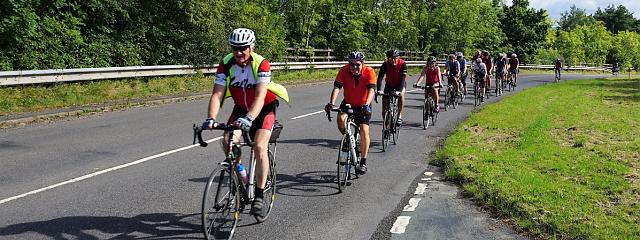- Charity says Welsh Government is ignoring huge swell of public support for change
- Cycling UK urges Government to build on legacy of Geraint Thomas
- UK celebrates 50 years of legal cycling on bridleways today
As cyclists celebrate 50 years today (03 August) of being legally allowed to ride on bridleways in the UK, Cycling UK is urging the Welsh Government not to lose momentum in its proposals to improve public access.
The right for people to cycle on bridleways was granted by the Countryside Act 1968 when the law commenced on 03 August 1968. These changes were due to campaigning by the Cyclists’ Touring Club, now Cycling UK, and this right to ride has allowed generations all to enjoy the wonders of the UK’s countryside from the saddle.
This move fifty years ago helped grant cyclists in England and Wales access to just over 20% of all rights of way. However, since 1968 there has been little change, meaning people riding bikes and/or horses are not allowed on 80 per cent of the rights of way network.
The UK’s rights of way network frequently interchanges between footpaths and bridleways, with often no noticeable change in quality between the two apart from a different signpost. This has clearly created confusion among the nation’s cyclists, as Cycling UK’s report “Rides of Way” discovered 74 per cent of people cycling on the UK’s rights of way network found it “unsuitable”.
Duncan Dollimore, Cycling UK’s head of campaigns said:
“While Cycling UK today celebrates our victory 50 years ago of being able to ride on traffic free routes in our countryside, we’re also looking to the future and what else can be improved.
“There’s a huge sway of public support for change to rights of way in Wales, and it’s a missed opportunity if they continue to sit on the fence on this important issue.”
Recently, the Welsh Government proposed to open its rights of way up to allow more cycling. This was roundly welcomed by Cycling UK through its Trails for Wales campaign, and other campaigning organisations which all saw the need for a change in access policy.
There was a large amount of public support for these proposals, with 16,468 out of a total of 17,391 responses supporting change to access laws in response to the Government’s consultation “Taking Forward Wales’ Sustainable Management of Natural Resources” in September 2017.
Mr Dollimore added:
“As Wales and the rest of the UK celebrates, the fantastic achievements of Geraint Thomas in the Tour de France, now’s the opportunity for the Welsh Government to build on his legacy and do more for the everyday cyclist.
“The Government sought the public’s opinion for their own proposals on how they could improve conditions for cycling off-road. A minority disagreed with an overwhelming majority, and now progress on public rights of way has been kicked into the long grass.”
Despite overwhelming public support for their own proposals, the Welsh Government in June 2018 announced, “now is not the right time for substantive reform” citing “strong but differing views”. Cycling UK has since written to Minister for the Environment, Hannah Blythyn AM, seeking an explanation for this move, and seeking a meeting to discuss next steps and how to improve countryside access pending future changes to the law.
Mr Dollimore said: “Improving public access, particularly in the creation or restoration of connected routes is a public good. Farmers, visitors and local communities in Wales will all benefit but let’s not wait another fifty years for this to happen.”
In the UK, only the Scottish Government has passed laws to improve access, with the Land Reform (Scotland) Act 2003. This law allows people the right to access and cross land for recreational and educational purposes, unless expressly forbidden to do so. Consequently local tourism has boomed, with cycle tourism estimated to generate between £236 and £358 million for the Scottish economy each year.



